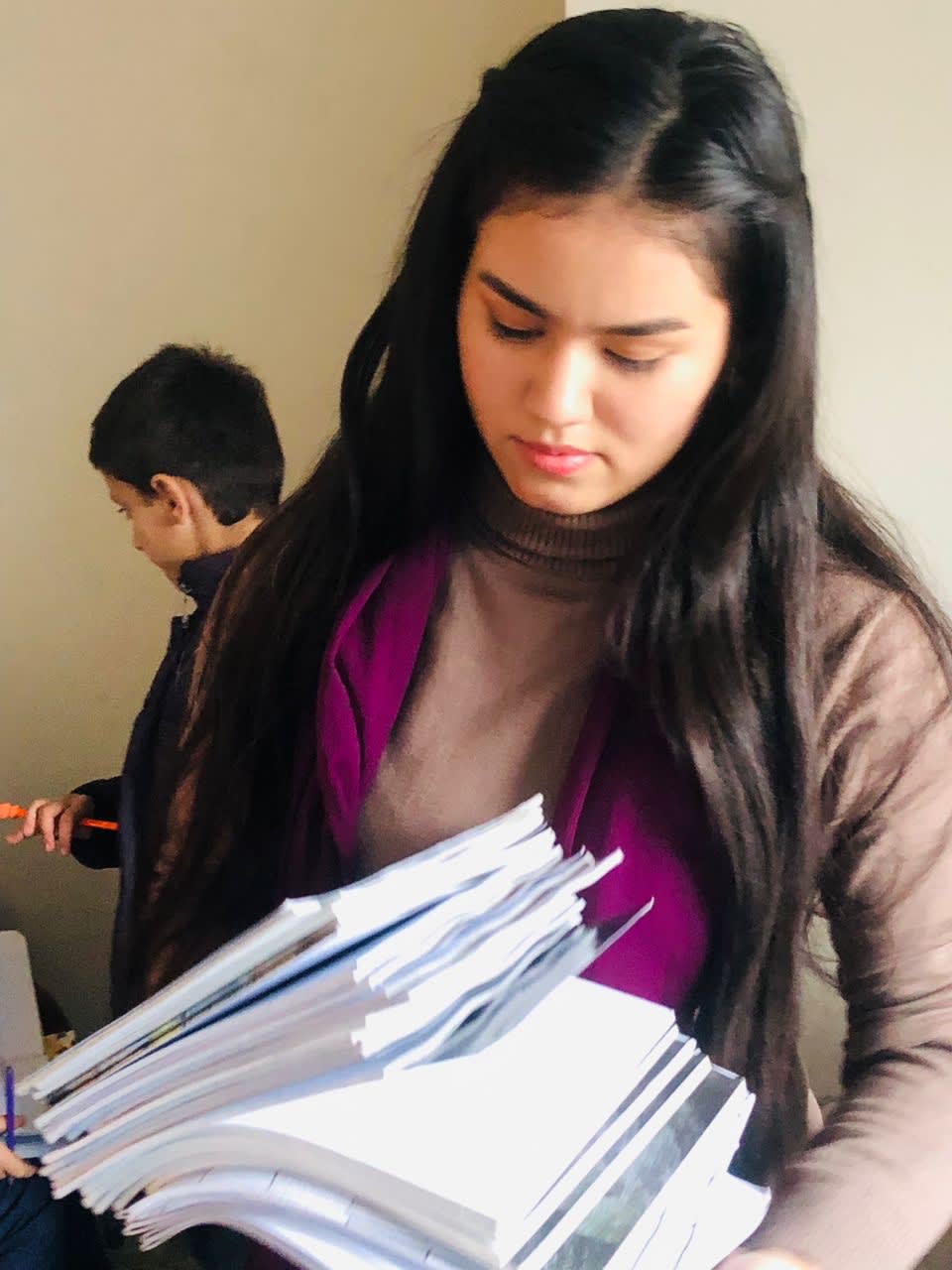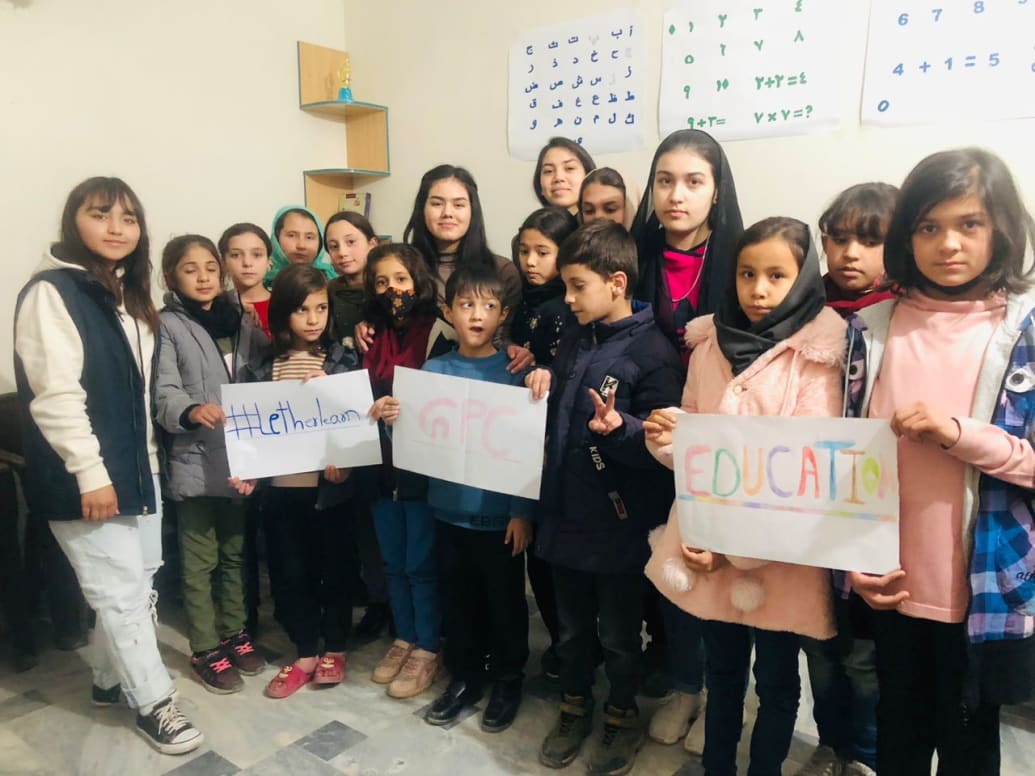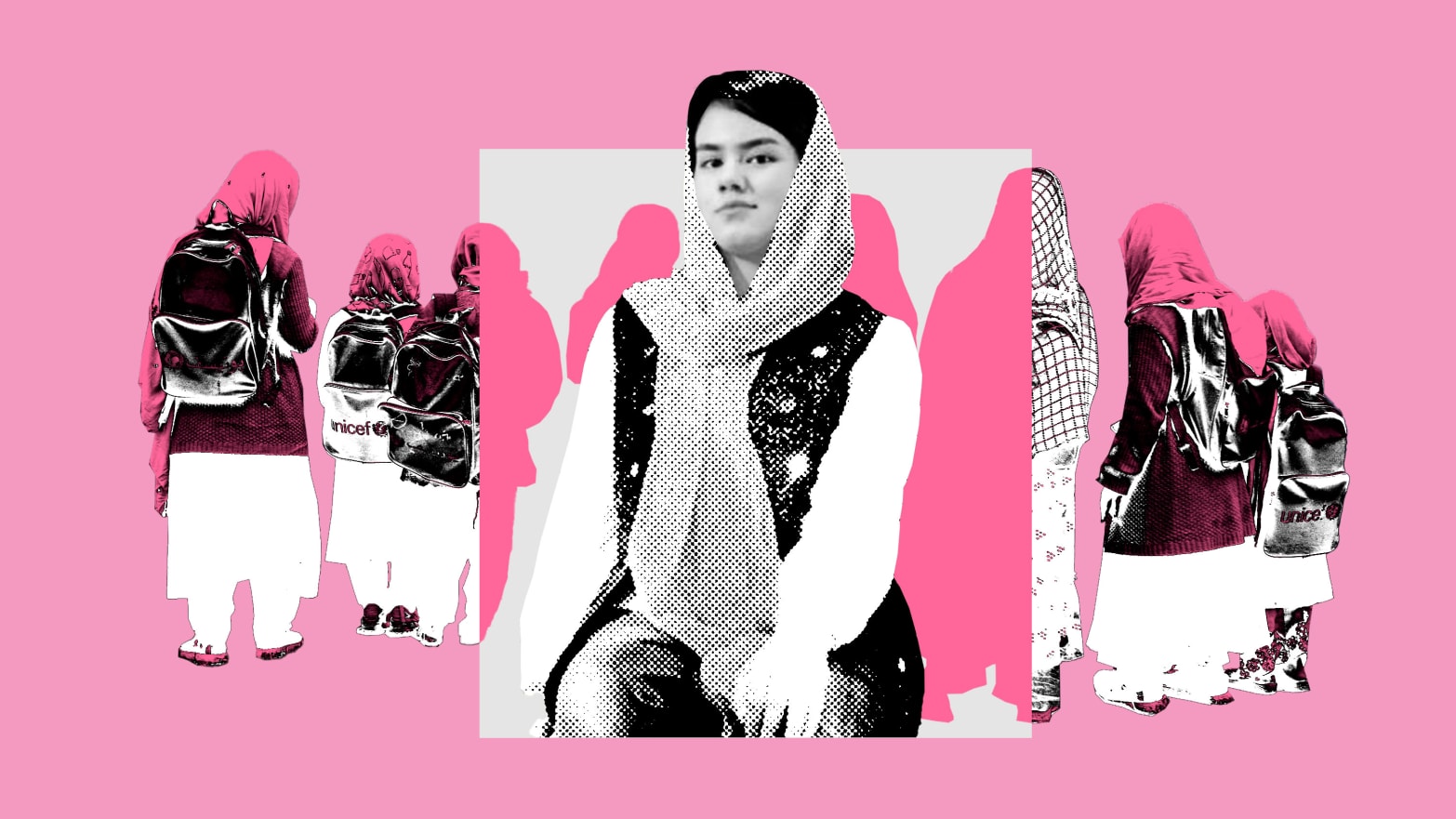Robina Azizi was only 16 years old when her country was overrun by Taliban soldiers. She and her family had left their town, Mazar-e-Sharif, the capital city of Afghanistan’s northwestern province of Balkh, only a week before, as news of the Taliban’s arrival was already widespread. Azizi was supposed to be at her 10th-grade exam the next day—but she would never finish her schooling.
“When I returned home from school, my mother asked me to pack my things as I was leaving for Kabul,” Azizi told The Daily Beast. “I protested because I still had my exam the next day. But my mother told me that if I didn’t leave now and if the Taliban came, they would force me to marry them.”
Azizi now lives in Pakistan, where she relocated with her family in Oct. 2022. Since the Taliban took control of Afghanistan in Aug. 2021, the country has become the world’s largest prison for women. The first education ban was announced for girls in grade six and above in Mar. 2022. In December, university education was also banned. More than 1 million girls and young women have been affected as a result. More than two years since the Taliban came to power, girls and women have been excluded from all public life, losing rights and civil liberties by the day.
“The situation is really bad for us because women are not allowed to walk on the streets,” said “Yalda,” a 20-year-old Afghan woman whose name has been withheld to protect her identity. Before the takeover, she excelled in her exams and aspired to study medicine; now the education ban imposed on girls and women forces her to stay at home.

Robina Azizi founded Girls on the Path of Change (GPC) in April 2023. Utilizing social media, she quickly spread the word, launching the first session and inviting girls from across the country to share their stories in an online community.
Courtesy of Robina Azizi
“We cannot leave our houses, and if they [Taliban] see a woman outside without a hijab, they can arrest them,” she said. “All day, we sit at home and do nothing. Sometimes I cry and don’t know what to do.”
When Azizi moved to the capital of Afghanistan just weeks before the country’s fall, she found herself in an online school. Seeing the struggles of girls in different provinces with their online classes, she decided to step in and help them navigate through courses and find suitable schools.
Azizi’s goal was to ensure they had everything they needed for successful online learning. Bringing together girls from various areas and assisting them in pursuing the education they wanted brought her a lot of happiness.
“We didn’t even have proper phones or internet or computers,” Azizi said. “But we somehow stayed connected through WhatsApp. Most of the girls I was helping at the time were my classmates from online school.”
Inspired by her experiences, Azizi founded Girls on the Path of Change (GPC) in April 2023. Utilizing social media, she quickly spread the word, launching the first session and inviting girls from across the country to share their stories in an online community.
"No one wants to listen to girls in Afghanistan; I wanted to change that. So, my first session was all about listening to them and understanding their problems,” she explained.
GPC’s main aim is to provide educational opportunities to Afghan girls affected by successive Taliban bans on education beyond grade six. Operating without funding, the organization relies on volunteers offering language classes and programs like photography and painting.
A month later, GPC launched its online courses with 10 volunteers in her team from around the world, and hundreds of students joining from all parts of Afghanistan. What began as a solo effort has now evolved into a more extensive team of 10 volunteers, with more than 600 students graduating from GPC classes in 2023.
The community is now expanding to include more teachers and students. Alexandra Slayton, who teaches English as a foreign language (TEFL) online from Massachusetts, is one such volunteer.
“One of my former students, Ana, taught Robina in a virtual class. It is through her that I learned about Robina and her story. I was intrigued by her so I requested Ana to set up a meeting with her,” Slayton said. “I was expecting to see an adult woman, especially since the organization was as well-established as it is[…] but was quite surprised to meet a teenager.”
Today, Azizi’s initiative successfully conducts workshops, exhibitions, and motivational seminars, reaching thousands of girls across more than five provinces in the country. It actively engages in various fields like photography, painting, writing, online commerce, foreign languages, poetry, and public speaking, with plans for further expansion in the near future.
Despite her good intentions, the “path for change” is not as easy or seamless as Robina would hope. The risks associated with the Taliban’s strict decrees and the logistical challenges of maintaining a steady internet connection pose significant obstacles.
Navigating Risks and Challenges
“Amaan,” whose name has been changed to protect his identity, is an education activist from Afghanistan’s Herat province and volunteers as a manager for GPC. He oversees their digital marketing and teaches beginner English courses. Despite his passion for the work with the organization, he is compelled to maintain a low profile for his safety.
"The government’s rules for girls and their education are not favorable for us,” Amaan told The Daily Beast. “However, it’s not the time to sit and ignore; it’s time to act.”
“They don’t know about us or where we are located,” he added. “If they find out, we will be arrested.”
In Oct. 2023, Pakistan announced that all undocumented Afghan migrants must leave the country. Since then, more than 1.7 million refugees have been repatriated to Afghanistan, and it is expected that more than 2 million will be affected by this ruling. For those still residing in Afghanistan, poor internet connection and a lack of infrastructure affect their ability to participate regularly in these classes.

What began as a solo effort has now evolved into a more extensive team of 10 volunteers, with more than 600 students graduating from GPC classes in 2023.
Courtesy of Robina Azizi
Yalda, who started learning English at GPC so she could continue her education, expresses frustration about missing classes due to the lack of WiFi at her home and the instability of her phone network. This concern is shared by her English teacher, Tamara, who joined as a volunteer after reading a post on the organization’s Facebook page.
“I was genuinely excited to support the Afghan girls and volunteered to teach English,” Tamara told The Daily Beast. “One challenge, as I mentioned, is the technological aspect; very often, we were cutting in and out. People didn’t have connectivity.”
The Way Forward
Azizi, who has recently moved to Germany from Pakistan, is well aware of the challenges of managing the organization. However, she remains optimistic that she can now complete her own education while simultaneously working on expanding the reach of GPC.
“I feel like I have more chances here, especially to help girls. No one can make me leave, and I feel really free,” she said. “I’ll do my best to create more opportunities for girls back home. Unlike in Pakistan, I don’t need any permits anymore, so I can work feeling much safer.”
Fortunately for her, volunteers like Slayton bring wealth of experience and provide valuable support to streamline operations to reach more people in Afghanistan. Slayton, who leveraged her network and built a LinkedIn page, GPC English Academy, has allowed the team to attract volunteers from various parts of the world who want to help in teaching Afghan girls. But the long-term goal is to secure funding.
“We dream to secure a grant from the US government to provide stipends for teachers and sustain their commitment,” Slayton said. “Additionally, the organization aspires to access a learning management system for classes, moving beyond the current limitations of free platforms like Google Meet and Zoom and moving to premium accounts to get more features to work with.”
As the organization establishes itself, many girls in Afghanistan feel that GPC and its initiative give them a new chance at life.
“I like GPC a lot. It helps girls like me who can’t go out to study,” Yalda said. “GPC lets me learn English online, and it encourages me to speak well. I have good teachers, and every day, I learn new things.”

